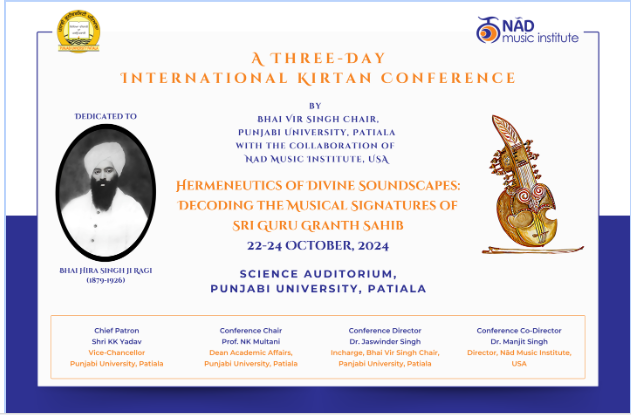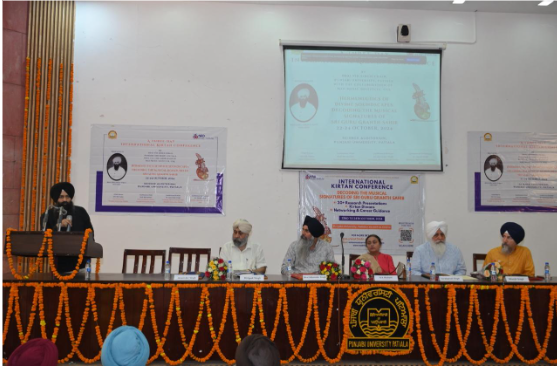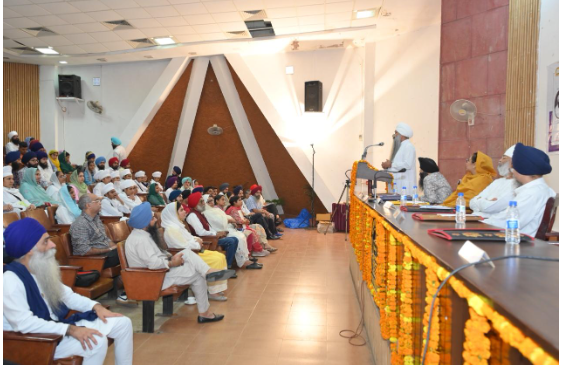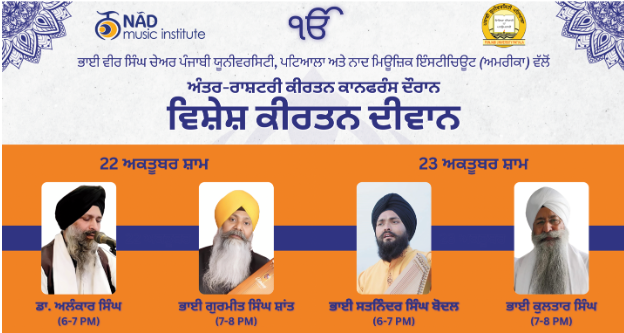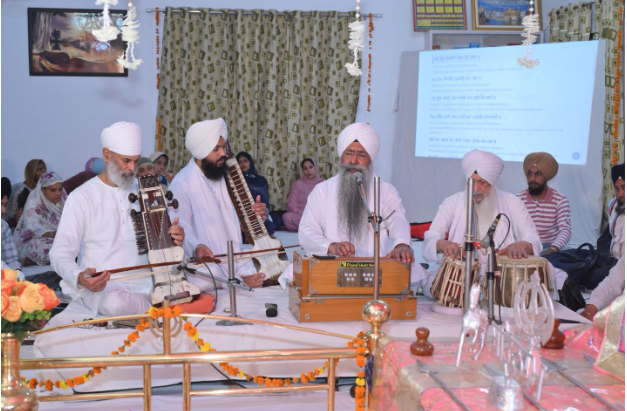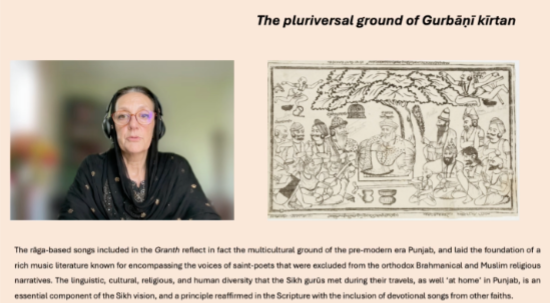Patiala, Punjab – October 24, 2024 – The International Kirtan Conference on Hermeneutics of Divine Soundscapes: Decoding the Musical Signatures of Sri Guru Granth Sahib concluded its transformative three-day gathering from October 22 to 24, 2024, at Punjabi University, Patiala. The event, organized by the Bhai Vir Singh Chair at Punjabi University and the Nad Music Institute (USA), attracted over 1,000 in-person participants and more than 275 registered attendees from 19 countries, including the United States, Canada, Australia, New Zealand, the United Kingdom, France, Germany, Malaysia, Pakistan, Mexico, the UAE, and India.
The conference paid tribute to Bhai Hira Singh ji Ragi, a prominent Ragi and contemporary of Bhai Vir Singh ji, whose legacy spans over a century. Divjyot Singh, the great-grandson of Bhai Hira Singh ji, provided poignant insights into his ancestor's life. Attendees received a commemorative book titled Amolak Hira - Bhai Hira Singh ji Ragi as a token of appreciation. The conference highlighted a vibrant interplay of history, contemporary perspectives, and future possibilities within the sacred tradition of Gurbani Kirtan, featuring an impressive array of paper presentations and discussions that explored the profound relationship between spirituality and the musical expressions found in the sacred verses of Sri Guru Granth Sahib.
Dr. Jaswinder Singh addressing participants during the inaugural ceremony of the conference (Left to Right: Dr. Jaswinder Singh, Divjyot Singh, Bhai Maninder Singh, Prof. N. K. Multani, Sarbpreet Singh, Dr. Manjit Singh)
Bhai Kultar Singh ji addressing participants on the concluding day of the conference
Evening Kirtan Performances: A Divine Resonance
In addition to the academic discourse, the evenings were enriched by soul-stirring Kirtan performances. Day 1 featured Dr. Alankar Singh, Head of the Gurmat Sangeet Department at Punjabi University, and Bhai Gurmat Singh Shant, Hazuri Ragi of Sri Harmandir Sahib, Amritsar, whose performances fostered a contemplative spiritual atmosphere.
Kirtani Jathas during evening diwans at Punjabi University Gurdwara Sahib (Left to Right: Dr. Alankar Singh, Bhai Gurmeet Singh Shant, Bhai Satninder Singh Bodal, Bhai Kultar Singh)
Day 2 culminated in a mesmerizing Kirtan Diwan led by Bhai Satninder Singh Badal and Bhai Kultar Singh Bhai Swaran Singh, Hazuri Ragi of Gurdwara Bangla Sahib and Sis Ganj Sahib, New Delhi, whose artistry in weaving tradition with contemporary expressions left a lasting spiritual impact on all attendees.
Kirtan Diwan on 23rd Oct, 2024 at Punjabi University Gurdwara Sahib (Left to Right: Ustad Surjeet Singh (Sarangi), Gurjeet Singh (Dilruba), Bhai Kultar Singh (Harmonium), Bhai Swaran Singh (Jori)
A Global Dialogue on Sikh Musicology
The conference's thematic structure focused on the historical evolution of Gurbani Kirtan, its current relevance, and visionary discussions regarding its future. Participants from around the globe transcended geographical boundaries, emphasizing the universality of the spiritual messages embedded in Sikh music.
Notable presentations included contributions from esteemed scholars such as Dr. Francesca Cassio (USA) and Dr. Harjinder Singh Lallie (UK), whose insights deepened the discourse on Sikh musicology, history, and sacred music traditions.
As the Sardarni Harbans Kaur Chair in Sikh Musicology at Hofstra University (NY), Dr. Cassio offered the keynote speech titled "Repositioning Gurbānī Sangīt in the Context of South Asian Musical Literature and Practices”. In her address, Dr. Cassio reconstructed an inclusive map of pre-colonial traditions in which Sikh musical heritage is also recognized as the repository of an ‘ecology of knowledges’ transmitted through rāga-based genres of music and sung poetry”.
Dr. Francesca Cassio, the Sardarni Harbans Kaur Chair in Sikh Musicology at Hofstra University, presenting online her keynote address titled ‘Repositioning Gurbānī Sangīt in the Context of South Asian Musical Literature and Practices’.
A Landmark Event in Sikh Music History
This landmark conference underscored the enduring significance of Sikh music and its ability to transcend time and space. By honoring the past and envisioning a future where Gurbani Kirtan continues to inspire spiritual journeys worldwide, the conference set a new standard for academic and spiritual engagement within the Sikh community.
Conference Director Dr. Jaswinder Singh emphasized the university's role as a neutral platform for diverse perspectives in Gurbani Kirtan, highlighting the potential for future research and collaborations. Conference Co-Director Dr. Manjit Singh also announced plans for ongoing partnerships with students, experts, and organizations dedicated to the research and teaching of Gurbani Kirtan.
Conference participants including distinguished guests, Dr. Jasbir Kaur (fifth from left), Dr. Neelam Kaur (sixth from left) and Taranpreet Kaur Mehndi (seventh from left)
Key Initiatives for the Future
Looking ahead, the conference laid the groundwork for several initiatives aimed at preserving and expanding the tradition of Gurbani Kirtan:
1. Establishing an international collaborative research network on Sikh musicology.
2. Creating platforms for ongoing virtual and in-person discussions among global scholars and practitioners.
3. Initiating academic exchange programs for students and emerging scholars focused on Gurbani Kirtan.
4. Expanding public engagement through workshops, seminars, and online courses exploring music, spirituality, and cultural identity.
5. Publishing the conference proceedings and past papers for wider dissemination.
6. Proactively educating about career opportunities for Sikh music practitioners.
For more details about the conference and upcoming initiatives, please contact [email protected] or visit the Nad Music Institute website at www.nadmusic.org.

